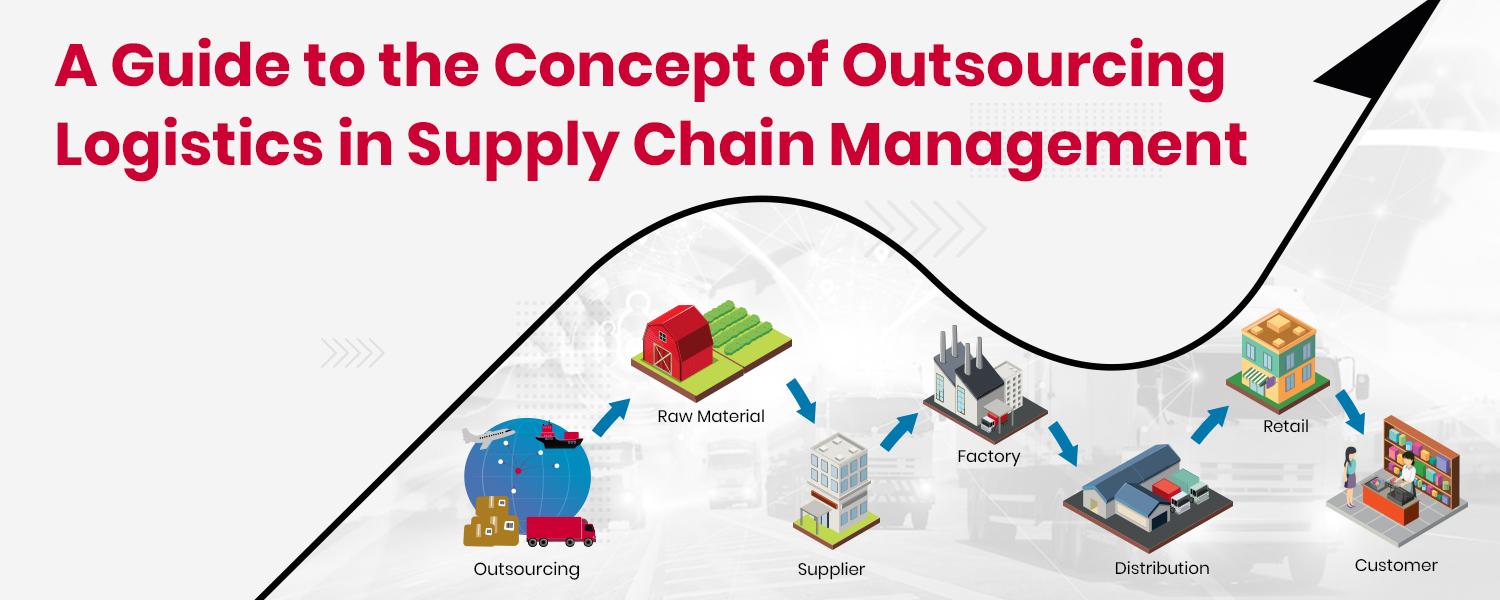This is the new age of business where complexities intertwine, markets evolve rapidly, and technology drives relentless change.
The role of logistics is like a heart pumping blood to each part of the body of any business–a ceaseless flow, delivering goods to their destination right on time, every time. But the pressures of cost, demand volatility, ever-changing regulations, and advanced technologies can make this heartbeat falter.
This is where the concept of logistics outsourcing rises, a strategic phenomenon that businesses worldwide are adapting to keep their operations robust. This shift frees businesses to focus on what they do best while these logistic maestros conduct the symphony of their supply chain processes.
In this guide, we’ll learn about the meaning of outsourcing logistics, explore its many benefits, delve into its various types, and bring to life its real-world applications through compelling examples.
What is Logistics Outsourcing?
Managing intricate logistics networks in-house can often feel like juggling too many balls at once. That’s where logistics outsourcing comes into play.
Logistics outsourcing is the process of using external third-party logistics (3PL) providers to manage functions that traditionally fell within an organization’s operations. These 3PLs take care of the logistics services so you can focus on the core competencies of your business.
Outsourcing logistics is like hitting a strategic lever, transitioning from handling operations in-house to assigning them to experts outside your organization.
3PLs provide a comprehensive array of services, including but not limited to transportation, warehousing, inventory management, packaging, and delivery. They are like an external department, seamlessly integrated with your organization, which handles the complex operations and routine tasks that keep the wheels of your supply chain rolling smoothly.
Benefits of Outsourcing Logistics in Supply Chain Management
1. Freedom to Focus on Core Operations
Businesses thrive when they can concentrate on their core competencies. Outsourcing logistics allows companies to dedicate their time, effort, and resources to what they do best. For example, a manufacturer can focus on enhancing product quality while the logistics service provider handles the delivery process.
2. Reduced Back-office Workload
3PLs come with their own well-equipped team of professionals who can handle large volumes of paperwork and auditing tasks that go hand-in-hand with logistics. This offloading of work not only streamlines the operations but also significantly improves productivity and overall time management within your organisation.
3. Enhanced Customer Satisfaction
3PLs specialise in logistics services and have a deep understanding of the domain. They consistently devise innovative strategies and solutions to improve customer experience and reduce costs. By outsourcing logistics, you can rest assured that your customers are getting top-tier service, leading to enhanced customer satisfaction.
4. Economies of Scale
Scaling an in-house logistics team can be costly and time-consuming. On the other hand, 3PLs, specialising in logistics, are designed to scale up or down based on your needs quickly. This flexibility saves costs and maintains operational efficiency, even during peak demand periods.
5. Efficient Real-time Tracking and Advanced Technology
Technologically advanced 3PLs offer real-time tracking and visibility of loads. Some can even integrate their operations with your Warehouse Management System (WMS) and Enterprise Resource Planning (ERP) for more streamlined logistics management. This technological proficiency not only keeps you updated but also saves you worry and time, allowing you to concentrate on other core areas.
Types of Logistics Outsourcing
1. Outbound Logistics Services
Outbound logistics services are a key component at the heart of supply chain management. Essentially, these services oversee the transport of goods from the production floor or warehouse to their final point of consumption. This complex process encompasses everything from packing and inventory management to transportation and delivery, with each operation choreographed to ensure seamless functioning.
2. Full Truckload (FTL) Services
Full Truckload (FTL) services are a specific type of logistics solution where a single truck is utilized to transport a dedicated shipment. From pick-up to drop-off, the goods remain in the same truck, offering a sense of security and consistency. This method is most advantageous when a large volume of goods needs to be transported, making the entire truck’s space economically efficient. By outsourcing FTL services, companies can ensure the safe and timely delivery of their goods, ultimately enhancing the overall supply chain performance.
3. Partial Truckload (PTL) Services
Partial Truckload (PTL) services, as the name suggests, are designed for shipments that do not require a full truckload. In this case, a truck’s space is shared between multiple clients, each with their individual shipments. This method is particularly beneficial when the shipment volume is not substantial enough for a full truckload but too large for traditional parcel services. By opting for PTL services, businesses can achieve cost-efficiency while also benefiting from the flexibility of less stringent requirements regarding the weight and size of the cargo.
4. Third-party (3PL) Logistics
Third-party Logistics (3PL) providers such as NimbusPost offer an extensive range of services, including smart warehousing, inventory management, shipping and receiving, picking and packing, and even reverse logistics. Many businesses choose to outsource their entire supply chain operations to 3PLs, capitalizing on their expertise, infrastructure, and technology to enhance efficiency and cost-effectiveness. The integrated services and live order tracking offered by 3PLs provide businesses with the peace of mind that their logistics operations are being expertly managed.
5. Fourth-party (4PL) Logistics
Taking logistics outsourcing a step further, Fourth-party Logistics (4PL) providers manage and oversee a company’s entire supply chain model. This approach centralises all logistics operations under one umbrella, providing the company with a single point of contact for all its logistics needs. The comprehensive services offered by 4PL providers not only streamline operations but also provide a holistic view of the supply chain, allowing for more strategic decision-making.
Example of Logistics Outsourcing
ClearCycle is an innovative platform that has transformed the traditional retail landscape. Their mission was to intertwine profitability with ecological responsibility, using data-driven strategies to enhance customer engagement and increase profits while making a positive environmental impact.
However, executing this unique approach posed its own set of challenges. ClearCycle’s model required them to manage a multitude of overstocks and returns efficiently, get them back to the market swiftly, and do so in a manner that adhered to the strict marketplace compliance requirements.
Recognizing the depth of these operational challenges, ClearCycle understood the necessity of a strategic alliance – they needed a logistics partner.
ClearCycle chose a 3PL fulfilment partner for three critical reasons:
- Their ability to scale operations to meet the needs of ClearCycle’s growing client base.
- Their deep understanding of marketplace requirements.
- Their capacity to provide an end-to-end solution enabled ClearCycle to focus on expanding its business.
The implementation of the partnership was a smooth process. 3PL seamlessly took over the management of returns, refurbishments, and reworks for ClearCycle.
The results of this outsourcing partnership were nothing short of remarkable. Since they collaborated with 3PL, ClearCycle has consistently achieved over 99.5% performance on marketplace metrics, a feat that was impossible before the partnership.
This improved performance allowed for faster sales, which positively impacted the environment by reducing the number of products ending up in landfills.
The ClearCycle-3PL partnership showcases how the right alliance can catalyze business growth, improve performance, and simultaneously support the company’s mission toward a sustainable future.
Also Read: Fulfillment Center vs. Warehouse – Comprehensive Comparison
Conclusion
The choice to outsource logistics is a strategic one that carries transformative potential for businesses. In this guide, we’ve gone through the conceptual depths, examined the forms outsourcing can take, highlighted the benefits it brings, and even looked at ClearCycle’s case study as a shining example of the power of logistics outsourcing.
But between all these benefits lies a vital choice – selecting the right service provider. NimbusPost, as a leading logistics aggregator, helps to find a partner that aligns with your business objectives, understands your market requirements, and can adapt and scale to your needs.
So, whether you’re a startup or an established enterprise, the question isn’t, ‘Should you outsource your logistics?’ Rather, it is ‘When will you start?’.




